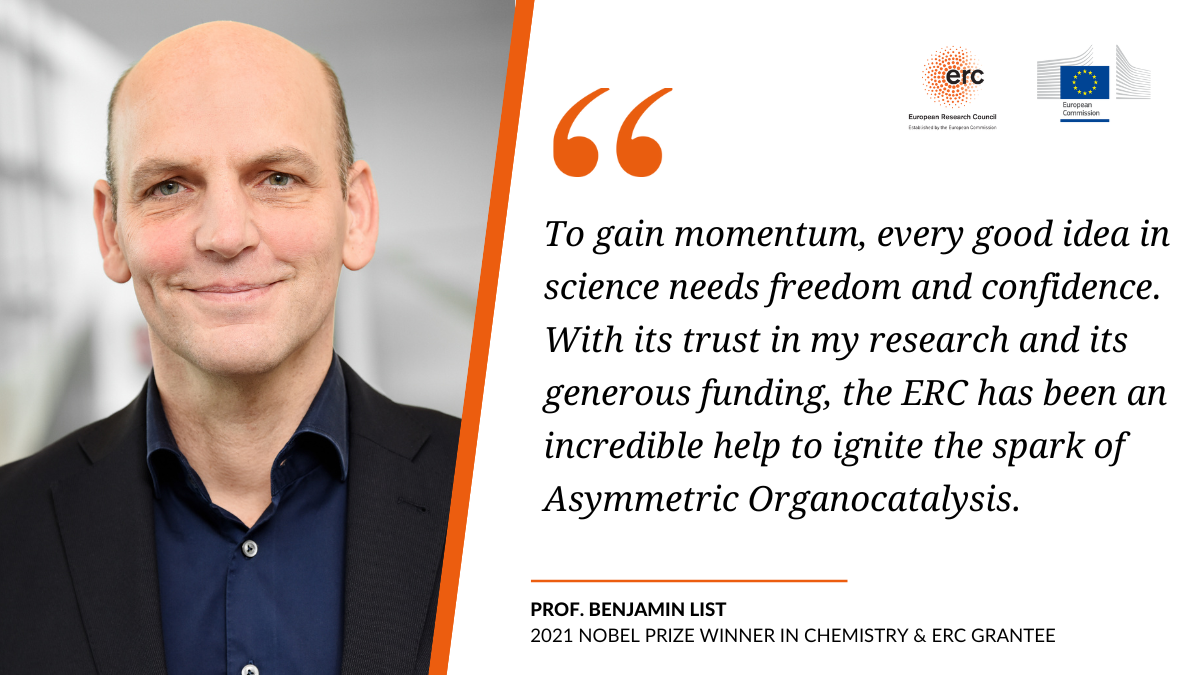
Benjamin List, two-fold grantee of the European Research Council (ERC), has been awarded the 2021 Nobel Prize in Chemistry “for the development of asymmetric organocatalysis.” He shares the award with David W.C. MacMillan. Professor List’s work in this field has been funded for a decade by two ERC Advanced Grants, worth in total € 4.5 million. It is the second 2021 Nobel Prize awarded to an ERC-funded scientist and the ninth Nobel Prize since the ERC’s launch in 2007.
The Royal Swedish Academy of Sciences recognised the laureates for their ground-breaking research resulting in the development of organocatalysts, precise tools to construct new molecules. This has had a great impact on pharmaceutical research and has helped to make chemistry greener.
Commissioner for Innovation, Research, Culture, Education and Youth Mariya Gabriel said: "Another happy day for European science! After yesterday’s news on the Physics prize, another great mind, Benjamin List, wins the Nobel Prize in Chemistry. He has been backed by the EU for over a decade through two individual European Research Council grants. Congratulations to both laureates on winning one of the highest accolades in the world of science.”
ERC President Designate Prof. Maria Leptin said: “Congratulations to today’s laureates! It is fantastic news that another ERC grantee has taken home a 2021 Nobel Prize. Benjamin List‘s research develops efficient catalysts that enable researchers to build for instance new molecules for medicines or solar cells, making chemistry greener and more selective. The ERC can be proud to have placed trust in Professor List, supporting his work since 2011. The number of ERC grantees who go on to win a Nobel bears witness to that giving top researchers the freedom to pursue their scientific dreams truly pays off.”
Benjamin List’s research work at Max-Planck-Institut für Kohlenforschung, Germany, has been funded by two ERC Advanced Grants from 2011 to 2021. Professor List’s ERC-funded work focused on creating novel organocatalysts. Many research areas and industries are dependent on chemists’ ability to construct molecules both selectively and efficiently. This work requires the mediation of catalysts, which are compounds that accelerate chemical reactions, without becoming part of the final product.
Professor List’s first ERC grant led to the development of original disulfonimide lewis-acid catalysts, which proved to be excellent organocatalysts in a wealth of fundamental organic synthetic transformations. They opened further opportunities for efficient synthesis of bioactive molecules. With his second ERC grant, Benjamin List aimed to design and develop the syntheses of efficient enantioselective organocatalysts, crucial to synthesise specific, desired versions of molecules. The research was at the border of the different fields of organic chemistry, homogeneous catalysis and physical-chemistry. These are some of the most efficient catalysts that chemistry knows.
He has also served as a panel member for the ERC evaluations several years.
Today's award follows that of eight other ERC grantees:
- Prof. Konstantin Novoselov was the first ERC grantee to receive a Nobel Prize in Physics for his work on graphene. He held a Starting Grant and in 2010 was amongst the youngest Nobel prize winners in history.
- Prof. Serge Haroche, ERC Advanced Grant holder, was awarded the 2012 Nobel Prize in Physics for ground-breaking experimental methods that enable measuring and manipulation of individual quantum systems.
- Professors Edvard I. Moser and May-Britt Moser, both ERC Advanced Grant holders, received the 2014 Nobel Prize in Physiology or Medicine for their discoveries of cells that constitute a positioning system in the brain.
- Prof. Jean Tirole, ERC Advanced Grant holder, received the 2014 Sveriges Riksbank Prize in Economic Sciences in Memory of Alfred Nobel for his work on examining competition, analysing how large companies should be regulated to prevent monopoly behaviour and protect consumers.
- Prof. Bernard Feringa, ERC Advanced Grant holder, received the 2016 Nobel Prize in Chemistry for the design and synthesis of molecular machines.
- Prof Peter J. Ratcliffe, ERC Advanced Grant holder, received the 2016 Nobel Prize in Physiology or Medicine “for their discoveries of how cells sense and adapt to oxygen availability.”
- Prof. Giorgio Parisi, ERC Advanced Grant holder, received the 2021 Nobel Prize in Physics.
In addition, the ERC has funded several researchers who were already Nobel Prize laureates when they won their ERC grants.
About the ERC
The ERC, set up by the European Union in 2007, is the premier European funding organisation for excellent frontier research. It funds creative researchers of any nationality and age, to run projects based across Europe. The ERC offers four core grant schemes: Starting Grants, Consolidator Grants, Advanced Grants and Synergy Grants. With its additional Proof of Concept Grant scheme, the ERC helps grantees to bridge the gap between their pioneering research and early phases of its commercialisation.
The ERC is led by an independent governing body, the Scientific Council, and the ERC President. Jean-Pierre Bourguignon was President on an interim basis from 27 July 2020 until 31 August 2021. Maria Leptin will take office 1 November 2021. The overall ERC budget from 2021 to 2027 is more than €16 billion, as part of the Horizon Europe programme, under the responsibility of the European Commissioner for Innovation, Research, Culture, Education and Youth, Mariya Gabriel.





